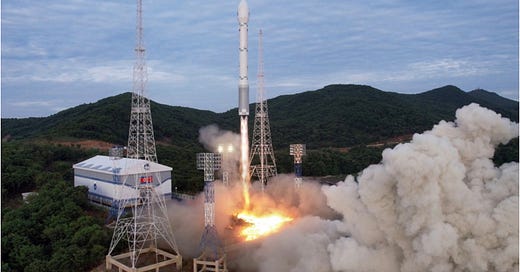Proliferation Security Initiative; NK failed satellite launch still violates sanctions; Possible return of Iran's USD7 billion from Seoul.
Prohibited Transactions for the week of 29 May 2023 (#6)
North Korea
A high-level meeting of the Proliferation Security Initiative (PSI) wrapped up in South Korea this week, with participants reaffirming their commitment to interdicting illegal transfers of weapons of mass destruction (WMD), increasing capacity-building activities, and addressing challenges from emerging technology. In a joint statement, participants noted the need to address risks from “cryptocurrency, intangible technology transfers, and the increasing sophistication of proliferators' tactics to circumvent international law.”
In conjunction with the PSI, a multinational maritime anti-proliferation interdiction exercise was held involving naval vessels from four nations.
A North Korean official stated that the PSI and interdiction exercise were preparations by the US for a future embargo against the DPRK.
Pyongyang’s failed launch attempt of a military reconnaissance satellite is still a violation of UN Security Council resolutions, according to South Korea’s ambassador to the US. North Korea’s government already stated that a new satellite will be put into orbit in the “near future.”
South Korea’s military has salvaged debris from the North Korean rocket for analysis. //If parts of the rocket are determined to include components traceable to non-North Korean companies (such as ones based in neighboring Russia or China) will they be sanctioned? At this point, it may be more effective to slow the DPRK’s technological efforts by sanctioning partnering companies outside the country which are providing goods or technical know-how to Pyongyang. Even if these non-DPRK companies don’t get designated, they would still present heightened risk to banks and other financial institutions, since they are essentially “sanctions adjacent” companies.
According to South Korean media, Beijing informed Seoul of a new set of Chinese policies regarding relations between the two nations, including the PRC not allowing South Korea to exercise any initiatives regarding North Korea, as long as Sino-South Korean relations remain rocky. //Though Beijing’s efforts toward enforcing sanctions against the DPRK are lackluster, will high level policies such as this one lead to even less enforcement by Chinese officials of North Korean illicit activities which may be occurring in China, or in Chinese territorial waters?
During the COVID-19 pandemic, North Korea built hundreds of miles of new or upgraded border walls, fences and guard posts, cutting off routes used by defectors and smugglers. //This limits the informal economy that exists between North Korea and China, but won’t have a negative impact on the state-sponsored smuggling and other illicit activities which keep the Kim family in power.
The US and South Korean governments jointly released a cybersecurity advisory about North Korea illicit actors using social engineering to hack think tanks, academia and the media. //The DPRK cyber actors discussed in this advisory aren’t targeting banks, but some of the red flag indicators are likely used by a number of different bad actors working on behalf of Pyongyang.
Iran
According to South Korean media, Seoul and Washington are discussing ways to release USD7 billion of Iranian money held in two Korean banks — Woori Bank and the Industrial Bank of Korea — since 2018, when the US reimposed sanctions on Iran. The money is payment for South Korean oil imports from Iran. If allowed to leave South Korea, the funds would reportedly be transferred to branches of Iranian banks in Middle Eastern countries neighboring Iran. //It seems like every year there is talk about how Seoul is on the cusp of releasing the USD7 billion as part of a US-brokered deal. The article states that the funds would have restricted use — such as paying for UN dues or purchasing COVID-19 vaccines — however, it’s unclear once the money is in the hands of the Iranian government, how these restrictions would be enforced.
Ukraine’s parliament is imposing sanctions on Iran, banning trade, investments and technology transfers, and stops Iranian goods from transiting through Ukraine, as well as denying Iranian airplanes the right to fly through Ukrainian airspace. The sanctions will be in effect for 50 years.
According to Iranian media, members of the Asian Clearing Union (ACU) agreed to launch their own banking messaging system within the next month, as an alternative to the existing SWIFT system. //The “launch” of this new system may occur within a month, but that’s a far cry from it actually being operational.
The ACU is made up of nine central banks from Bangladesh, Bhutan, India, Iran, the Maldives, Myanmar, Nepal, Pakistan and Sri Lanka.
A Chinese diplomat in Iran stated that the PRC’s investment in Iran increased by 150 percent in 2022, that the value of trade last year between the two nations reached USD15.8 billion, and that China has been Iran’s largest trading partner for 10 consecutive years. Separately, Iran’s exports to Russia and other nations in Central Asia and the Caucasus rose 18 percent to USD3.2 billion between March 2022 and March 2023.
The US government designated a number of Iranian operatives tied to the Islamic Revolutionary Guard Corps (IRGC) and its external operations arm, the IRGC-Qods Force, who participated in various terrorist plots, including assassination attempts.



